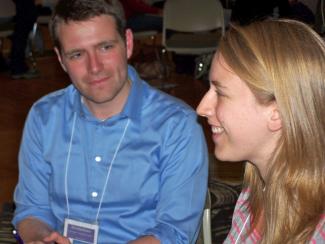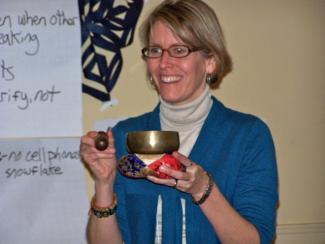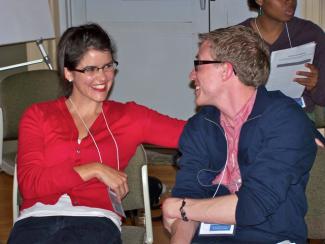By Deborah Gardner Walker
They came from all over the country to explore servant leadership and walking “The Jesus Way.” More than 120 young adult interns and directors from 17 Episcopal Service Corps (ESC) programs gathered at Lasell College in Newton, May 6-8, to discern how they would carry out, in their own places and ways, the words of Micah 6:8—“to act justly, love mercy and walk humbly with God.”
Participants came from 13 states—California, Connecticut, Illinois, Kentucky, Louisiana, Maryland, Massachusetts, Nebraska, New Jersey, New York, North Carolina, Ohio and Texas—with the largest contingent of 22 interns from the Diocese of Massachusetts’ Life Together program, 16 of whom were responsible for organizing and leading the weekend.
It was “the first gathering of this scope of the Episcopal Service Corps,” according to the Rev. Arrington Chambliss, Director of Life Together.
“By gathering, we got to hear who we are,” Chambliss said. “We got to see ourselves as a growing network and as a movement of young leaders in the Episcopal Church.”
Chambliss explained that the other ESC program directors asked Life Together to share how its program is grounded in servant leadership. “We focused on public narratives that call them into action as people of faith and allowed their stories to be the content of the weekend. We offered a process, not a curriculum. Our hope is that this will send forth the interns onto their next step in the world.”
They got to practice this on the second day of the conference, which was spent sharing what some called their “burning bush moment.” Half a dozen participants courageously got up to tell a condensed, 90-second version of their personal story. The full group joyously clapped and loudly sang “Can I get a witness? Can I get a witness?” as each one walked to the microphone.
The first young woman told of how witnessing childhood friends’ circumstances of “heart-wrenching” pain and suffering led her to make the choice to change her life and to work and make a stand for people who are oppressed.
Another young woman spoke about her own realizations after volunteering with the migrant community in Mexico. “From that moment on, it became my call to share my voice to speak for people who don’t have a voice,” she said.
A third described how she felt “indicted” when she experienced the “systematic injustice” of poor areas surrounding her college. “I grew up in the privileged environment of small towns that were 100 percent white. I did not realize that this was not what the rest of the world experienced. I had to reconcile that disconnect,” she said.
After college, she went to Los Angeles to work with homeless people and practiced the “ministry of presence” for those who many just walk by on the street.
The Rev. John deBeer, Rector of St. Mark’s Church in Burlington, next facilitated a two-hour exercise to help participants discover what they deeply and passionately “want” by examining their public narrative. Natalie Finstad, who was a Life Together intern last year, came forward to help demonstrate the process.
“My first experience of a loving God was in the Episcopal Church,” she said. “I went to the Baptism of a friend’s child. When I heard that the church respected the dignity of all human beings, it grounded me. I felt my worthiness. This motivated me to work with the Life Together program last year and compelled me to go to Kenya this year.”
Finstad went on to describe how she heard a call during her nine months of community organizing in Kenya to help alleviate child poverty. She worked with Gloria, a Kenyan woman who founded an orphanage after her abusive father threw her out of their home. “My call was to develop a sense of worthiness in Gloria,” she said.
Using the repeated question “What do you want?” to help Finstad explore her story more deeply, deBeer showed participants how they could “sit with their desires and choices and see what change they could bring.”
“The deepest truth is that we are called to be on the Jesus way,” deBeer said. “We don’t have to find the energy—the energy is within us.”
Freelance writer and photographer Deborah Gardner Walker is a parishioner at St. Peter’s Church in Beverly, where she is a catechist in the Catechesis of the Good Shepherd spiritual formation program for children.
More about the corps:
As the first gathering ever held for the complete roster of Episcopal Service Corps programs, with new and emerging ones included, according to Nicholas Hayes (in his second-year with Life Together, this year as a fellow), the May 6-8 training weekend’s goals were to build community across the ESC while also providing training in the Massachusetts Life Together program’s leadership model, “The Jesus Way,” of which public narrative is a core component.
Hayes described the public narrative that the interns practiced during their weekend training as both “a leadership art and a discernment art” that is about “telling an individual and a community story as a summons to action. It can be a powerful way of grounding people in their call.”
The training event, he said, was a way for Life Together to reveal and share its particular motivational core, with the hope that other member programs might do the same in the future.
The Episcopal Service Corps calls itself “a federation” of young adult service corps programs across the United States that each in its own way “helps young adults discern the inner ‘voice’ that is calling them to their life’s work, and to develop the skills to listen and respond through a life of service.”
Each program has different requirements and charisms—some have a contemplative approach, while others are focused more around activism or community organizing, for example—but all are shaped by the shared beliefs, including, that how young adults spend those years profoundly shapes the rest of their lives; that working for justice and peace is an essential part of Christian life; that service to others changes lives; and that the church will be changed for the good by the “lived theology” of ESC interns.



